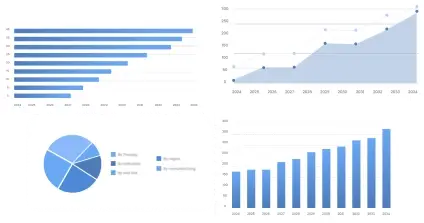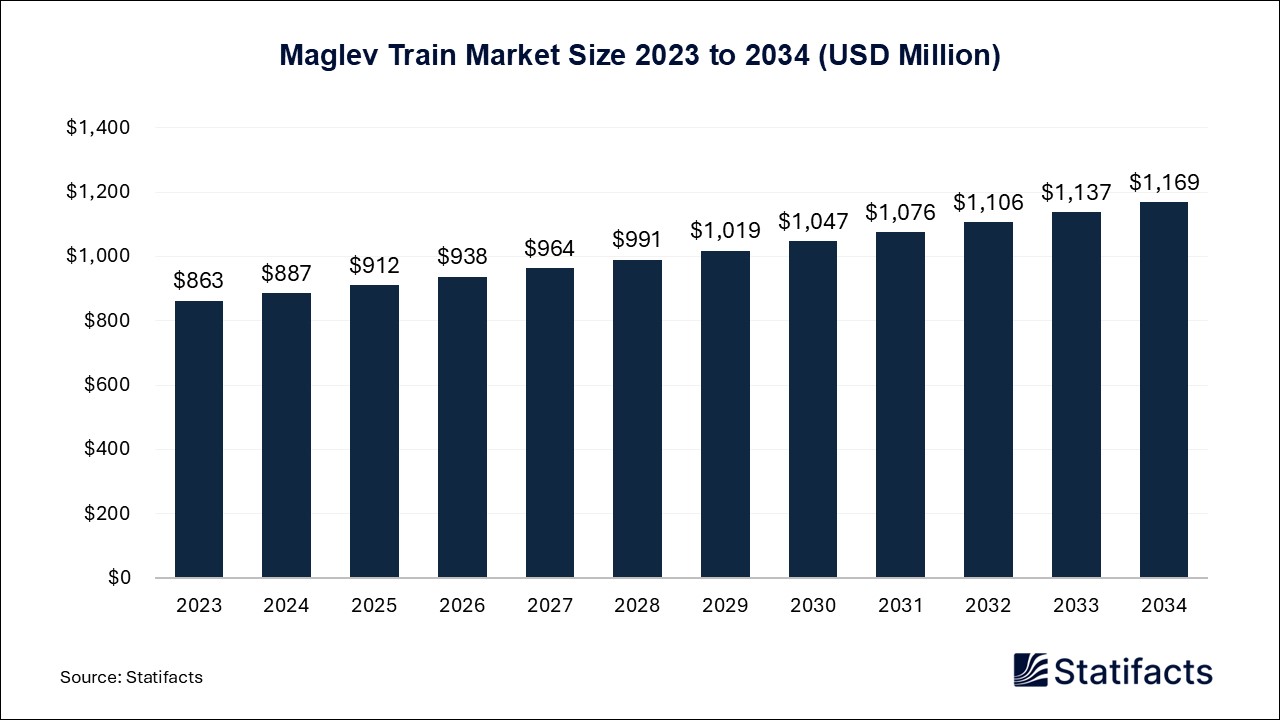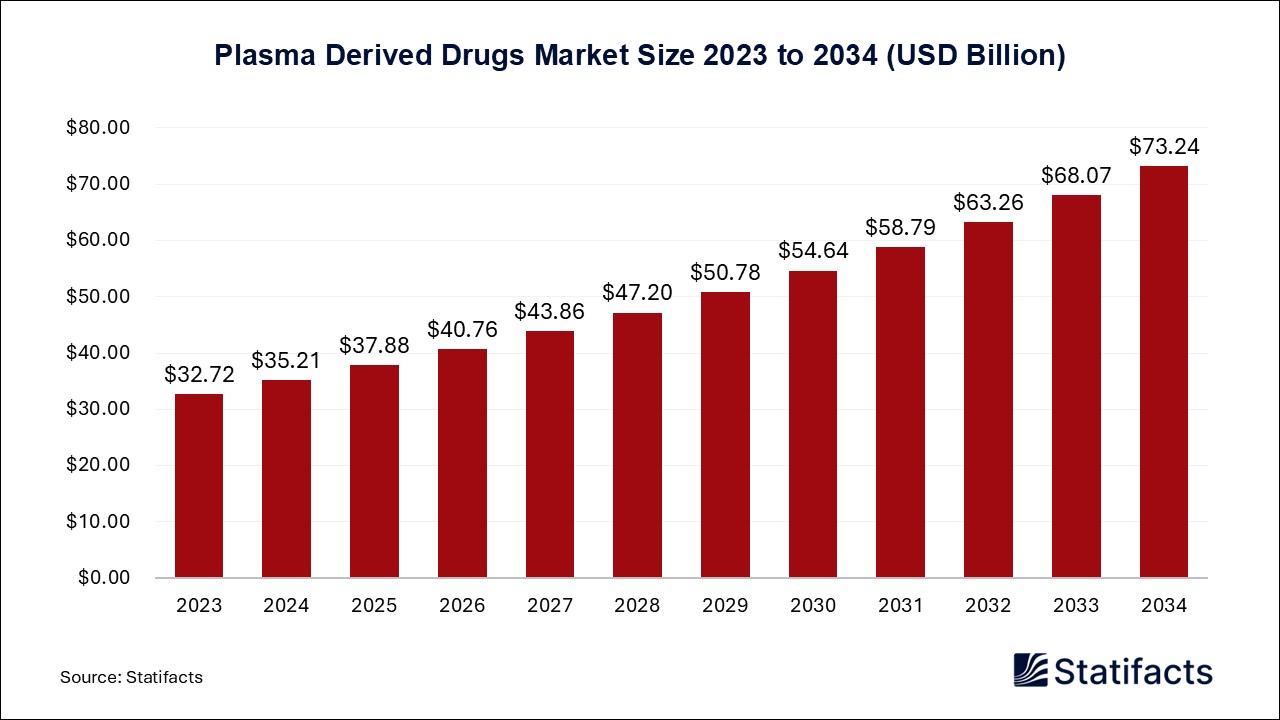Last Updated: 24 Jul 2025
Source: Statifacts
By clicking “Accept All Cookies” you agree to the storing of cookies on your device to enhance site navigation, analyze site usage, and assist in our marketing efforts.
Privacy Policy
Fertility Drugs Market (By Offering: Gonadotropin, Anti-estrogen, Others; By Technology: Assisted Reproductive Technology, Fertility Drugs; By End-user: Fertility Clinics, Hospitals, Clinical Research Institutes; By Region: North America, Europe, Asia Pacific, Latin America, Middle East & Africa) Industry Size, Share, Growth, Trends 2025 to 2034.

The global fertility drugs market size accounted for USD 10.6 billion in 2024 and is predicted to touch around USD 17.3 billion by 2034, growing at a CAGR of 5.02% from 2025 to 2034.
| Industry Worth | Details |
| Market Size in 2025 | USD 11.06 Billion |
| Market Size by 2034 | USD 17.3 Billion |
| Market Growth Rate from 2025 to 2034 | CAGR of 5.02% |
The fertility drugs market concerns itself with the production and distribution of reproductive therapeutics aimed at women who are trying to get pregnant but have been unfitted to do so naturally. They are the essential treatment for women who have fertility issues associated with polycystic ovary syndrome, as well as men and women who deal with fertility issues linked to hormone imbalances. Many women undergo ovulation problems, either absent or infrequent ovulation, which can remarkably hamper natural conception. Fertility drugs, such as gonadotropins and clomiphene citrate, are generally used to induce ovulation or enhance the quality of eggs released. These medications mimic natural hormones such as FSH and LH, stimulating the ovaries to produce and then release eggs.
Fertility drugs can be utilized along with egg freezing for women who prefer to delay childbearing or are willing to preserve their fertility before experiencing medical treatments that may impact their ability to conceive.
AI plays a vital role in embryo selection. Conventionally, embryologists manually analyze embryos to understand their viability. AI-generated tools can process hundreds of thousands of embryo images and specifically identify those with the greatest likelihood of successful implantation, enhancing the precision of selection. AI improves drug selection and dosing based on patient-specific variables, thus enhancing ovarian stimulation and decreasing the number of treatment cycles. AI-optimized protocols decreased follicle-stimulating hormone (FSH) use by up to 20%, potentially reducing medication expenses.
AI’s potential is amplified by incorporation with genomics, robotics, and wearables. icONE’s genomic-clinical information fusion achieves 92% implantation accuracy, enhancing euploid embryo selection. Wearables permit personalizing stimulation protocols, real-time hormonal monitoring, while AI-powered robotics in sperm banks drives efficiency by 35%.
Fertility market drivers are the various societal and lifestyle changes that have increased the prevalence of reproductive disorders, along with the development of new fertility drugs and new methods of detecting inherited diseases, disorders. With research being undertaken on the now increasingly prevalent conditions, such as Polycystic Ovary Syndrome (PCOS), as well as endometriosis.
Rising numbers of women are delaying pregnancy, usually into their late 30s and 40s, when fertility naturally decreases, increasing the likelihood of needing fertility treatments. Continuous developments in fertility drugs and assisted reproductive technologies (ART) have enhanced success rates and have made treatments more accessible, thus boosting market expansion. Drugs such as luteinizing hormone (LH) and follicle-stimulating hormone (FSH) are utilized to stimulate egg production and its maturation in women experiencing IVF or other ART procedures.
Development of new and more effective fertility drugs
Fertility drugs such as Clomiphene and FSH agonists are utilized to stimulate ovulation in women who have challenging ovulating. These drugs have been utilized for decades, but ongoing research targets on improving their effectiveness and reducing side effects. Developments in genetic screening, which include preimplantation genetic testing (PGT), permit the detection of genetic disorders and chromosomal abnormalities in embryos before implantation, raising the chances of a healthy pregnancy.
Obstacles in the fertility drugs market are prohibitive treatment costs, a lack of adequate research undertakings, especially in terms of female reproductive diseases, and very limited insurance coverage.
Limited insurance coverage
Fertility treatments, mainly in vitro fertilization, can be very costly, with expenses ranging from thousands to tens of thousands of dollars. The high out-of-pocket expenses can be a remarkable barrier, forcing some patients to delay or forgo treatment, or to seek less costly, and potency less effective, alternatives. The shortage of coverage disproportionately affects those with reduction socioeconomic status as well as those in states without mandated coverage.
The fertility drugs market is expected to grow during the coming years due to innovations in assisted reproductive technology with the help of AI, genetic testing, and stem cell research, enhancing fertility treatment success rates while raising important ethical and social considerations.
ART techniques include the manipulation of sperm, eggs, or embryos to raise the likelihood of a successful pregnancy. ART procedures generally involve the handling of sperm, eggs, and embryos to attain fertilization and implantation. Techniques like IVF and cryopreservation are generally standard practices in fertility clinics globally. In recent years, emerging technologies such as genetic testing, artificial intelligence (AI), and stem cell research have thus refined ART, improved its success rates, while labeling ethical and social implications. The usage of hormonal contraception can be referred to help in the timing of ART cycles, decrease the risk of ovarian cysts at IVF cycle initiation, and improve visualization before hysteroscopy.
“Exceptional compassion is the cornerstone of Dallas IVF’s mission,” Brian Barnett, MD, medical director at Dallas IVF, said in a statement. “When considering joining a larger network, finding a partner that shared our values of patient care and inclusivity was paramount. Ivy Fertility offers hope to families all over the world, and we are excited to contribute to that effort as the newest member of their collaborative network.”
"The researchers and physicians within Prelude's esteemed network of clinics continue to show their dedication to advancing reproductive medicine through insightful and meaningful research," says TJ Farnsworth, Founder and CEO of Inception Fertility, the parent company to Prelude. "We look forward to another remarkable year at the ASRM Scientific Congress and continuing the growth in the field of fertility."
“We are incredibly proud to launch our Freeze and Share Programme, which represents a significant advancement in our fertility services,” said Mel Chacksfield, CEO of Apricity Fertility. “This new service will not only make egg freezing more accessible and affordable to the many women who may not usually have the chance to preserve their fertility, but will also mean we can better support our families and parents who rely on donor eggs to start their families. “Our commitment to providing personalised care through innovation in the sector continues to drive us forward, ensuring we meet the evolving needs of all our patients”. To be eligible for egg sharing, women will need to meet specific criteria such as BMI, age, and ovarian reserve. They will have unlimited counselling throughout the process to ensure they are fully informed and supported from the start.
“We are thrilled with the results of this trial, which highlight OXO-001’s potential to become the first therapeutic treatment to increase embryo implantation success, with a non-hormonal drug using a new mechanism of action, acting directly on the endometrium,” said Dr Ignasi Canals, chief scientific officer at Oxolife, the Spanish biotech company behind the trial, which is due to be presented at the European Society of Human Reproduction and Embryology’s 40th annual meeting in Amsterdam.
The gonadotropin segment dominated and expected to sustain the position with the fastest rate of growth in the fertility drugs market in 2024. Gonadotropins are greatly effective in stimulating egg production and maturation, making them a preferred alternative for many fertility treatments. Continuous developments in gonadotropin therapies, like the advancement of recombinant FSH and LH, are improving their efficacy and safety profiles.
The anti-estrogen segment shows a notable rate of growth in the fertility drugs market during the forecast period. The global fertility market is undergoing significant expansion due to a rising number of individuals undergoing infertility. This rise is associated with numerous factors, including lifestyle changes, delayed childbearing, and environmental factors. Aromatase inhibitors, such as letrozole, are considered by few to be superior to CC in ovulation induction due to their reduction in anti-estrogenic effect on the endometrium. The market is also undergoing a trend towards personalized medicine, with artificial intelligence and machine learning-powered tools that allow for increasing specialization in treatment protocols, improving results drastically for both male and female infertility.
By offering, the assisted reproductive technology segment dominated the fertility drugs market due to an umbrella of these technologies, which include intrauterine insemination, Intracytoplasmic Sperm Injection, and in-vitro fertilization to improve patient fertility. Assisted reproductive technologies have resulted in an expansion of the fertility sector due to their unique advantages, including lower health risks associated with reproductive therapeutics and a climbing success rate. Newer advances such as time-lapse imaging of embryos, preimplantation genetic testing, and vitrification of both embryos and eggs have significantly improved patient outcomes.
By offering, the fertility drugs segment is expected to grow at a significant rate in the fertility market during the forecast period. Fertility drugs are becoming widely popular, with more people opting for assisted reproduction, first through these drugs, then IVF treatments, and other ART components. Fertility medication is less invasive and cost-prohibitive compared to long-term treatments. The need for these therapies is also being driven by lifestyle factors, delayed childbirth, and increased infertility rates.
The fertility clinics segment dominated the fertility drugs market in 2024. Fertility clinics are an important end-user of fertility drugs, which specialize in reproductive health and providing comprehensive treatment alternatives, including those involving drugs such as gonadotropins. While fertility clinics are a remarkable part of the market, factors such as the rising rates of infertility, the availability of numerous fertility treatments, and the growth in the number of fertility centers worldwide are also contributing to the overall market expansion.
The hospital segment is the fastest-growing in the fertility drugs market during the forecast period. Hospital pharmacies currently hold a remarkable revenue share in the infertility drugs market, and this is anticipated to continue growing. Hospitals are usually the main point of contact for patients pursuing fertility treatments, especially those involving ART procedures. This centralized access led to the dominant position. While hospital pharmacies are contributing in this way, online pharmacies are also undergoing significant expansion, providing patients convenience and discretion, mainly in remote areas.
Europe dominated the fertility drugs market in 2024. Europe boasts well-known healthcare systems and is a strong target of research and development in reproductive medicine. This includes developed technologies, enhanced treatment protocols, and a commitment to innovation in areas such as embryo selection and genetic screening. Increased knowledge of ART methods such as IVF and ICSI, combined with developments in these technologies, is also leading to the expansion of the market.
Asia-Pacific is the fastest-growing fertility drugs market during the forecast period. Asia Pacific is considered a hub for medical tourism for fertility treatments, captivating patients from other regions. Increased stress, diabetes, obesity, and unhealthy lifestyle choices are leading to rising infertility rates in both women and men. Growing healthcare infrastructure and rising government support are enhancing access to fertility treatments. As women delay childbirth, their fertility naturally decreases, increasing the need for assisted reproductive technologies.
The fertility drugs market is undergoing strong growth, driven by rising infertility rates, developments in assisted reproductive technologies (ART), and delayed childbearing. Competition is intense, with firms focusing on strategic partnerships, product differentiation, and technological innovation.
Bayer AG (Bayer) is a life science firm that engages in the discovery, development, production, and commercialization of pharmaceuticals, consumer health goods, and crop science solutions. Its major goods include high-value seeds, enhanced plant traits, innovative chemical and biological crop protection products, prescription products, digital solutions, diagnostic imaging equipment, and over-the-counter medicines, among others.
Merck & Co. Inc. (Merck) is a biopharmaceutical firm that discovers, manufactures, develops, and markets medicines, biologic therapies, vaccines, and animal health products. The firm offers prescription medicines under the therapy areas of vaccines, oncology, infectious diseases, immunology, neuroscience, cardio-metabolic disorders, and ophthalmology. It also provides a broad range of veterinary pharmaceuticals, health management solutions and services, traceability, identification, and monitoring products.
Company Name: Ferring Pharmaceuticals
Year of Incorporation: 1950
Headquarters: Saint-Prex, Switzerland
Ferring International Center SA (Ferring), a subordinate of Ferring Holding SA, is a research-driven, specialty biopharmaceutical firm. Its main activities include research and development in women's health, reproductive medicine, gastroenterology, and urology. Ferring's product portfolio includes treatments for maternal health and reproductive medicine, gastroenterology and microbiome,uro-oncology, urology, endocrinology, and orthopedics.
| Regions | Shares (%) |
| North America | 35% |
| Asia Pacific | 28% |
| Europe | 25% |
| LAMEA | 12% |
| Segments | Shares (%) |
| Gonadotropin | 50% |
| Anti-estrogen | 30% |
| Others | 20% |
| Segments | Shares (%) |
| Assisted Reproductive Technology (ART) | 40% |
| Fertility Drugs | 60% |
| Segments | Shares (%) |
| Fertility Clinics | 45% |
| Hospitals | 40% |
| Clinical Research Institutes | 15% |
Published by Deepa Pandey
| Offering | 2024 | 2025 | 2026 | 2027 | 2028 | 2029 | 2030 | 2031 | 2032 | 2033 | 2034 |
|---|---|---|---|---|---|---|---|---|---|---|---|
| Gonadotropin | 5.30 | 5.51 | 5.73 | 5.95 | 6.19 | 6.43 | 6.68 | 6.94 | 7.22 | 7.49 | 7.78 |
| Anti-estrogen | 3.18 | 3.34 | 3.51 | 3.68 | 3.87 | 4.06 | 4.27 | 4.48 | 4.71 | 4.94 | 5.19 |
| Others | 2.12 | 2.28 | 2.46 | 2.64 | 2.84 | 3.05 | 3.27 | 3.51 | 3.76 | 4.04 | 4.32 |
| Technology | 2024 | 2025 | 2026 | 2027 | 2028 | 2029 | 2030 | 2031 | 2032 | 2033 | 2034 |
|---|---|---|---|---|---|---|---|---|---|---|---|
| Assisted Reproductive Technology | 4.24 | 4.54 | 4.86 | 5.21 | 5.57 | 5.96 | 6.37 | 6.81 | 7.28 | 7.77 | 8.30 |
| Fertility Drugs | 6.36 | 6.59 | 6.83 | 7.07 | 7.32 | 7.58 | 7.85 | 8.12 | 8.41 | 8.70 | 9.00 |
| End-user | 2024 | 2025 | 2026 | 2027 | 2028 | 2029 | 2030 | 2031 | 2032 | 2033 | 2034 |
|---|---|---|---|---|---|---|---|---|---|---|---|
| Fertility Clinics | 4.77 | 5.09 | 5.42 | 5.78 | 6.16 | 6.57 | 7.00 | 7.45 | 7.94 | 8.45 | 9.00 |
| Hospitals | 4.24 | 4.41 | 4.58 | 4.76 | 4.95 | 5.15 | 5.35 | 5.56 | 5.77 | 6.00 | 6.23 |
| Clinical Research Institutes | 1.59 | 1.64 | 1.68 | 1.73 | 1.78 | 1.83 | 1.88 | 1.93 | 1.98 | 2.03 | 2.08 |
| Region | 2024 | 2025 | 2026 | 2027 | 2028 | 2029 | 2030 | 2031 | 2032 | 2033 | 2034 |
|---|---|---|---|---|---|---|---|---|---|---|---|
| North America | 3.71 | 3.86 | 4.02 | 4.19 | 4.36 | 4.54 | 4.72 | 4.91 | 5.11 | 5.32 | 5.54 |
| Asia Pacific | 2.97 | 3.17 | 3.39 | 3.62 | 3.87 | 4.13 | 4.41 | 4.70 | 5.02 | 5.35 | 5.71 |
| Europe | 2.65 | 2.77 | 2.90 | 3.03 | 3.17 | 3.32 | 3.47 | 3.63 | 3.80 | 3.97 | 4.15 |
| LAMEA | 1.27 | 1.32 | 1.38 | 1.44 | 1.50 | 1.56 | 1.62 | 1.69 | 1.76 | 1.83 | 1.90 |
Last Updated: 24 Jul 2025
Source: Statifacts
| Subsegment | 2024 | 2025 | 2026 | 2027 | 2028 | 2029 | 2030 | 2031 | 2032 | 2033 | 2034 |
|---|---|---|---|---|---|---|---|---|---|---|---|
| Gonadotropin | 5.30 | 5.51 | 5.73 | 5.95 | 6.19 | 6.43 | 6.68 | 6.94 | 7.22 | 7.49 | 7.78 |
| Anti-estrogen | 3.18 | 3.34 | 3.51 | 3.68 | 3.87 | 4.06 | 4.27 | 4.48 | 4.71 | 4.94 | 5.19 |
| Others | 2.12 | 2.28 | 2.46 | 2.64 | 2.84 | 3.05 | 3.27 | 3.51 | 3.76 | 4.04 | 4.32 |
| Subsegment | 2024 | 2025 | 2026 | 2027 | 2028 | 2029 | 2030 | 2031 | 2032 | 2033 | 2034 |
|---|---|---|---|---|---|---|---|---|---|---|---|
| Assisted Reproductive Technology | 4.24 | 4.54 | 4.86 | 5.21 | 5.57 | 5.96 | 6.37 | 6.81 | 7.28 | 7.77 | 8.30 |
| Fertility Drugs | 6.36 | 6.59 | 6.83 | 7.07 | 7.32 | 7.58 | 7.85 | 8.12 | 8.41 | 8.70 | 9.00 |
| Subsegment | 2024 | 2025 | 2026 | 2027 | 2028 | 2029 | 2030 | 2031 | 2032 | 2033 | 2034 |
|---|---|---|---|---|---|---|---|---|---|---|---|
| Fertility Clinics | 4.77 | 5.09 | 5.42 | 5.78 | 6.16 | 6.57 | 7.00 | 7.45 | 7.94 | 8.45 | 9.00 |
| Hospitals | 4.24 | 4.41 | 4.58 | 4.76 | 4.95 | 5.15 | 5.35 | 5.56 | 5.77 | 6.00 | 6.23 |
| Clinical Research Institutes | 1.59 | 1.64 | 1.68 | 1.73 | 1.78 | 1.83 | 1.88 | 1.93 | 1.98 | 2.03 | 2.08 |
| Subsegment | 2024 | 2025 | 2026 | 2027 | 2028 | 2029 | 2030 | 2031 | 2032 | 2033 | 2034 |
|---|---|---|---|---|---|---|---|---|---|---|---|
| North America | 3.71 | 3.86 | 4.02 | 4.19 | 4.36 | 4.54 | 4.72 | 4.91 | 5.11 | 5.32 | 5.54 |
| Asia Pacific | 2.97 | 3.17 | 3.39 | 3.62 | 3.87 | 4.13 | 4.41 | 4.70 | 5.02 | 5.35 | 5.71 |
| Europe | 2.65 | 2.77 | 2.90 | 3.03 | 3.17 | 3.32 | 3.47 | 3.63 | 3.80 | 3.97 | 4.15 |
| LAMEA | 1.27 | 1.32 | 1.38 | 1.44 | 1.50 | 1.56 | 1.62 | 1.69 | 1.76 | 1.83 | 1.90 |
Demand is rising due to increasing infertility rates caused by delayed parenthood, lifestyle shifts, and environmental factors. Greater treatment awareness, fertility clinics, and telemedicine access further boost the usage of fertility medications globally.
Hormonal agents, particularly gonadotropins, dominate globally and are the fastest-growing class due to their effectiveness in assisted reproductive technologies (ART). Innovations in oral and long-acting formulations are also gaining traction.
These medications are primarily distributed through hospital and specialty pharmacies, with online pharmacy channels increasingly popular for convenience. Rising coverage via employer benefits and insurance is helping expand access.
High treatment costs, limited reimbursement, inequitable access, especially in lower-income regions, and regulatory hurdles impede broader adoption. The cumulative burden of multiple cycles can be prohibitive for many patients.
Innovations in personalized medicine (AI-guided regimens, genetic profiling), the emergence of male-focused fertility drugs, affordable biosimilars, and the growth in Asia-Pacific markets driven by healthcare infrastructure investment are fueling future market potential.
To get full access to our Market Insights, you need a Professional Account or a Business Suite.

You will receive an email from our Business Development Manager. Please be sure to check your SPAM/JUNK folder too.

You will receive an email from our Business Development Manager. Please be sure to check your SPAM/JUNK folder too.

Our customers work more efficiently and benefit from




